

AI at work: Staff 'hired and fired by algorithm' Scientific Research and Big Data. 1.
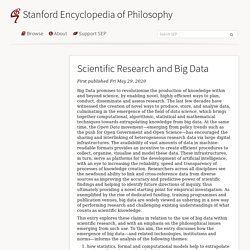
What Are Big Data? We are witnessing a progressive “datafication” of social life. Human activities and interactions with the environment are being monitored and recorded with increasing effectiveness, generating an enormous digital footprint. The resulting “big data” are a treasure trove for research, with ever more sophisticated computational tools being developed to extract knowledge from such data. One example is the use of various different types of data acquired from cancer patients, including genomic sequences, physiological measurements and individual responses to treatment, to improve diagnosis and treatment. A useful starting point in reflecting on the significance of such cases for a philosophical understanding of research is to consider what the term “big data” actually refers to within contemporary scientific discourse.
7 Examples Of Big Data Usecases In Real Life - Intellipaat Blog. Updated on 13th Jul, 16 43946 Views In this era where every aspect of our day-to-day life is gadget oriented, there is a huge volume of data that has been emanating from various digital sources.
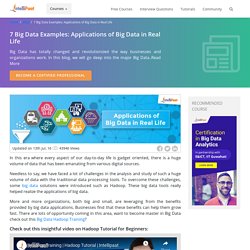
Ten simple rules for responsible big data research. Citation: Zook M, Barocas S, boyd d, Crawford K, Keller E, Gangadharan SP, et al. (2017) Ten simple rules for responsible big data research.
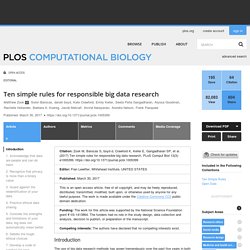
PLoS Comput Biol 13(3): e1005399. Editor: Fran Lewitter, Whitehead Institute, UNITED STATES Published: March 30, 2017 This is an open access article, free of all copyright, and may be freely reproduced, distributed, transmitted, modified, built upon, or otherwise used by anyone for any lawful purpose. A Prominent AI Ethics Researcher Says Google Fired Her. Google fires Margaret Mitchell, another top researcher on its AI ethics team. Google has fired one of its top artificial intelligence researchers, Margaret Mitchell, escalating internal turmoil at the company following the departure of Timnit Gebru, another leading figure on Google’s AI ethics team.
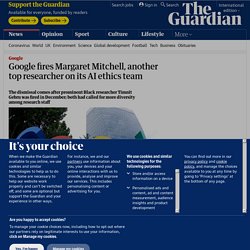
Mitchell, who announced her firing on Twitter, did not immediately respond to requests for comment. In a statement to Reuters, Google said the firing followed a weeks-long investigation that found she moved electronic files outside the company. Google said Mitchell violated the company’s code of conduct and security policies. Google’s ethics in artificial intelligence research unit has been under scrutiny since December’s dismissal of Gebru, a prominent Black researcher in Silicon Valley.
Gebru’s exit prompted thousands of Google workers to protest. Gebru and Mitchell, who is white, had called for more diversity among Google’s research staff and expressed concern that the company was starting to censor research critical of its products. Reuters contributed reporting. Google targets AI ethics lead Margaret Mitchell after firing Timnit Gebru. Google has revoked Ethical AI team leader Margaret “Meg” Mitchell’s employee privileges and is currently investigating her activity, according to a statement provided by a company spokesperson.
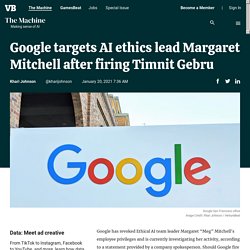
Should Google fire Mitchell, it will mean the company has effectively chosen to behead its own AI ethics team in under two months. In an interview with VentureBeat last month, former Google AI ethics co-lead Timnit Gebru said she had worked with Mitchell since 2018 to create one of the most diverse teams within Google Research. Gebru tweeted Tuesday evening that Google’s move to freeze Mitchell’s employee account echoed the way hers was frozen before she was fired. When VentureBeat emailed Google to ask if Mitchell was still an employee, a spokesperson provided the following statement: We read the paper that forced Timnit Gebru out of Google. Here’s what it says.
Many details of the exact sequence of events that led up to Gebru’s departure are not yet clear; both she and Google have declined to comment beyond their posts on social media.
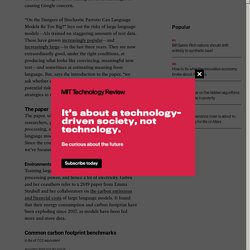
But MIT Technology Review obtained a copy of the research paper from one of the coauthors, Emily M. Bender, a professor of computational linguistics at the University of Washington. Though Bender asked us not to publish the paper itself because the authors didn’t want such an early draft circulating online, it gives some insight into the questions Gebru and her colleagues were raising about AI that might be causing Google concern. Google sacks founder of its artificial intelligence ethics programme amid 'sexism and discrimination' claims. Tech giant Google has fired the head of its artificial intelligence (AI) ethics programme, claiming she had broken the rules on moving files outside of the company.

Margaret Mitchell tweeted the she had been let go by the firm on Friday, with the move coming a month after she had publicly vented about the way her former peer, Timnit Gebru, was dismissed. In a statement, Google said that Ms Mitchell's violations "included the exfiltration of confidential business-sensitive documents and private data of other employees" following an investigation last month. According to some reports, Ms Mitchell had been locked out of her work account for five weeks in the build up to her dismissal, including her emails and the corporate system.
Her colleague, Ms Gebru, left Google late last year and says she was fired - but the firm said she resigned - in a dispute over a research paper. What is big data? More than volume, velocity and variety… – IBM Developer. You’ve heard of Big Data, right?
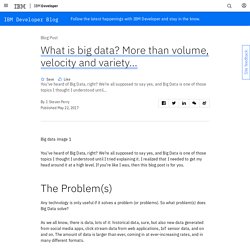
We’re all supposed to say yes, and Big Data is one of those topics I thought I understood until I tried explaining it. I realized that I needed to get my head around it at a high level. If you’re like I was, then this blog post is for you. The Problem(s) Any technology is only useful if it solves a problem (or problems). Survey predicts pandemic-driven innovation in workplace, health, big data. The novel coronavirus may drive new innovation in the workplace, healthcare and in the application of big data analytics and artificial intelligence, according to a new survey of technology executives by the Atlantic Council think-tank.
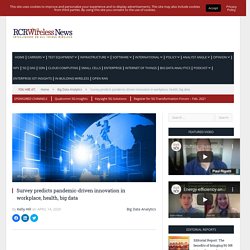
The Atlantic Council’s GeoTech Center surveyed 100 tech experts about their expectations on the impacts of COVID-19 on technology development and innovation in five key fields: the future of work, data and artificial intelligence, trust and supply chains, space commercialization, and health and medicine. Space-related development was tagged as the only area that those surveyed didn’t think would see a significant impact on innovation, driven by the pandemic. Big Data and the Internet of Things - Hitachi - The Atlantic Sponsor Content. Amazing Facts and Figures About the Evolution of Hard Disk Drives. It took 51 years before hard disk drives reached the size of 1TB (terabyte, i.e. 1,000GB).
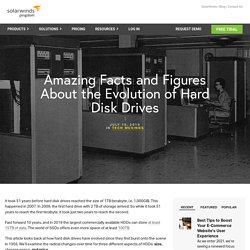
This happened in 2007. In 2009, the first hard drive with 2 TB of storage arrived. So while it took 51 years to reach the first terabyte, it took just two years to reach the second. Fast forward 10 years, and in 2019 the largest commercially available HDDs can store at least 15TB of data. 6 Predictions About Data In 2020 And The Coming Decade. It’s difficult to make predictions, especially about the future.
But one fairly safe prediction is that data will continue eating the world in 2020 and the coming decade. The most important tech trend since the 1990s will no doubt accentuate its presence in our lives, for better or for worse. At the beginning of the last decade, IDC estimated that 1.2 zettabytes (1.2 trillion gigabytes) of new data were created in 2010, up from 0.8 zettabytes the year before. The amount of the newly created data in 2020 was predicted to grow 44X to reach 35 zettabytes (35 trillion gigabytes). Two years ago, we were already at 33 zettabytes, leading IDC to predict that in 2025, 175 zettabytes (175 trillion gigabytes) of new data will be created around the world.
Latest publications. VID 20210113 WA0002. Worst Revolution Ever. Fired up by the Great Orator, they charged their way into the Capitol building, which turned out to be as heavily fortified as a slice of angel food cake. The proximate aim of the action was to get inside and stop the certification of the Electoral College vote so that Trump could win.* In one widely circulated video, police with riot shields tried to block the entry of one group of rioters, who yelled at them, “Pussies! Pussies!” “So the real scandal is: Why did anyone ever listen to this guy?” « Statistical Modeling, Causal Inference, and Social Science.
John Fund writes: [Imperial College epidemiologist Neil] Ferguson was behind the disputed research that sparked the mass culling of eleven million sheep and cattle during the 2001 outbreak of foot-and-mouth disease. He also predicted that up to 150,000 people could die. There were fewer than 200 deaths. . . .In 2002, Ferguson predicted that up to 50,000 people would likely die from exposure to BSE (mad cow disease) in beef. In the U.K., there were only 177 deaths from BSE.In 2005, Ferguson predicted that up to 150 million people could be killed from bird flu. In the end, only 282 people died worldwide from the disease between 2003 and 2009.In 2009, a government estimate, based on Ferguson’s advice, said a “reasonable worst-case scenario” was that the swine flu would lead to 65,000 British deaths.
I don’t know. I guess I’d have to see the exact quotes that are being referred to in the paragraphs excerpted above. Satya Nadella: crisis requires co-ordinated digital response. This article is a part of a series in which the Financial Times asks leading commentators and policymakers what to expect from a post-Covid-19 future The writer is chief executive of Microsoft Society’s deepest concerns are rooted right now in two connected questions: how do we protect public health and how can we promote an economic recovery that is inclusive? A third question is becoming more important because intensive use of technology has become so central to the other two: how do we preserve the privacy and cyber security needed for trustworthy computing? The past two months have seen digitisation progression that would ordinarily take two years generated by the demands of remote working and the need for accurate data and intelligence.
Neither the public nor the private sector alone can provide the answers. As a software platform and tools company, we at Microsoft view ourselves as digital first responders when the true first responders call from the front lines. Amp.theguardian. We knew this was coming. In her 1994 warning to the world, The Coming Plague, Laurie Garrett concluded: “While the human race battles itself, fighting over ever more crowded turf and scarcer resources, the advantage moves to the microbes’ court.
They are our predators and they will be victorious if we, Homo sapiens, do not learn how to live in a rational global village that affords the microbes few opportunities.” Open data hub launches to track global responses to COVID-19. Imperial College London has launched a new survey to track how populations are responding to the coronavirus pandemic. Led by the College’s Institute of Global Health Innovation and in partnership with YouGov, the survey will collect responses from 30,000 people from 29* countries every week.
Scientists have been sounding the alarm on coronavirus for months. Why did Britain fail to act? On 24 January, Chinese doctors and scientists reported the first description of a new disease caused by a novel coronavirus. Science Has Always Been Inseparable from Politics. Amazon reaps $11,000-a-second coronavirus lockdown bonanza. The online retailer Amazon has been described as a “clear winner” from the coronavirus crisis, its share price surging by more than a third inside a month, its customers spending almost $11,000 a second on its products and services, and its owner, Jeff Bezos, reinforcing his position as the world’s richest person with a fortune of $138bn. While most businesses have been hit hard by the impact of the pandemic and the looming recession, shares in Amazon have risen to a record high as hundreds of millions people stuck in lockdown conditions turn to the delivery giant to keep them fed and entertained.
Bezos, who started Amazon in his garage in 1994 and still owns 11% of the company’s shares, saw his paper fortune swell by $6.4bn (£5.1bn) on Tuesday alone as Amazon’s shares hit a record $2,283 – valuing the Seattle-based company at $1.14 trillion. The shares continued to climb on Wednesday and were changing hands at $2,295. The next wave of coronavirus disruption? Automation.
It’s funny how quickly the strange and unfamiliar become routine. How to stop your smart home spying on you. During an interview with the BBC last year, Google’s senior vice-president for devices and services, Rick Osterloh, pondered whether a homeowner should disclose the presence of smart home devices to guests. “I would, and do, when someone enters into my home,” he said. Trump’s Tweeting Isn’t Crazy. It’s Strategic, Typos and All. In the morning hours of Oct. 30, as most of the country slept, President Trump was binge tweeting again. At 2:32 a.m., he told his 87.3 million Twitter followers: “Way ahead in Texas! MIT Senseable City Lab. The Observer view on the information commissioner's Cambridge Analytica investigation. Big Data Made Simple - One source. Many perspectives. What is data visualisation? A definition, examples and resources. The Top 10 Types of Data Visualization Made Simple – Boost Labs. Research shows that we create 2.5 quintillion bytes of data every single day.
People Have Been Using Big Data Since the 1600s. 5 Google Projects That Changed Big Data Forever. Data Science is OSEMN - Randy Lao - Medium. Controversial Data Science Experiments. 8 Examples of Industries Using Predictive Analytics Today. What Is Predictive Analytics? 3 Real-World Examples of Predictive Analytics in Business Intelligence. 17 Data Science Applications & Examples You Should Know. The 7 Most Important Data Mining Techniques. 5 data mining methods - The Daily Universe. Coding Over the Cracks: Predictive Analytics and Child Protection. Accenture Universal Principles Data Ethics. Why Big Data Has Been (Mostly) Good for Music. The story behind the UK's coronavirus symptom tracker app.
Coronavirus: Amazon, Microsoft and Palantir to aid NHS data analysis, says report. Catherine D’Ignazio: 'Data is never a raw, truthful input – and it is never neutral' How do I invite contributors to a group collection? – Wakelet.
Uses of Big Data. 'More scary than coronavirus': South Korea's health alerts expose private lives. The Smart, the Stupid, and the Catastrophically Scary: An Interview with an Anonymous Data Scientist. - The Washington Post. How Do We Create Information? Big Data Timeline- Series of Big Data Evolution. Idc seagate dataage whitepaper. What is Big Data Visualization? Global social media research summary 2019. The complicated truth about China's social credit system. Projects. How Big Data Helps Avoid Cybersecurity Threats.
Researchers Used This Genealogy Site to Build a 13 Million-Person Family Tree. Making sense of too much data. Data scientist jobs: Where does the big data talent gap lie? Can big data save these children? Big data’s power is terrifying. That could be good news for democracy. Will Democracy Survive Big Data and Artificial Intelligence? Data Analyst, the most in-demand job of the coming years - Morning Future. How We've Been Visualising Big Data Over the Centuries.
15 Stunning Data Visualizations (And What You Can Learn From Them) Robots are being used to deter homeless encampments in San Francisco. The Good, The Bad and The Robot: Experts Are Trying to Make Machines Be "Moral" The (Human) Ethics of Artificial Intelligence — KABLAMO. BCS - The Chartered Institute for IT.
Consent Form. The big problem with big data? Without theory, it's just garbage. Facebook slammed for censoring burn victim's birthday photo. Sky Views: Democracy burns as Facebook lets fake news thrive. Facebook data - as scandalous as MPs’ expenses? We Spent Two Weeks Wearing Employee Trackers: Here’s What We Learned. Smart cities need thick data, not big data. Speech: My Data Made Me Do It: Ethical Considerations of Big Data - September 30, 2016 - Office of the Privacy Commissioner of Canada. Google employees reportedly quit over military drone AI project.
The rise of big data policing. Order From Chaos: How Big Data Will Change the World. The Future of Big Data? Three Use Cases of Prescriptive Analytics. Information is Beautiful. The Chart Doctor. Music Timeline. Big data unites the study of stars with cancer research - BBC News. Big Data Visualization with Meaning.
YouGov Profiles LITE. Children shouldn't learn to code. Ultimately, machines will be better. Big Data Tutorials. 10 actual uses of big data. From Fitbit to PlayStation, the justice system is drowning in digital evidence. Beyond the hype: Big data concepts, methods, and analytics. 4 Infrastructure Requirements for Any Big Data Initiative - FedTech. Aadhaar: Is India's biometric ID scheme hurting the poor?